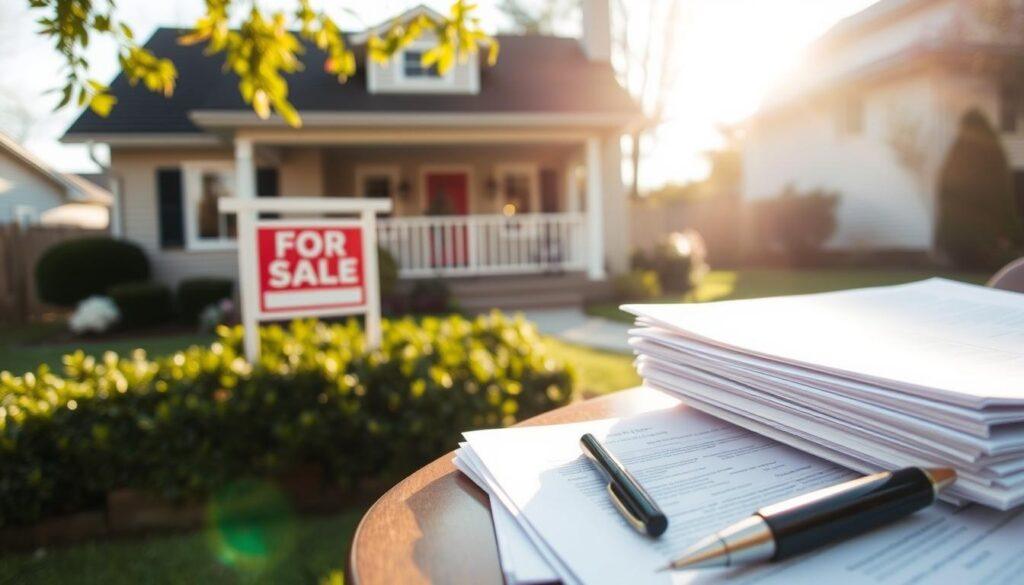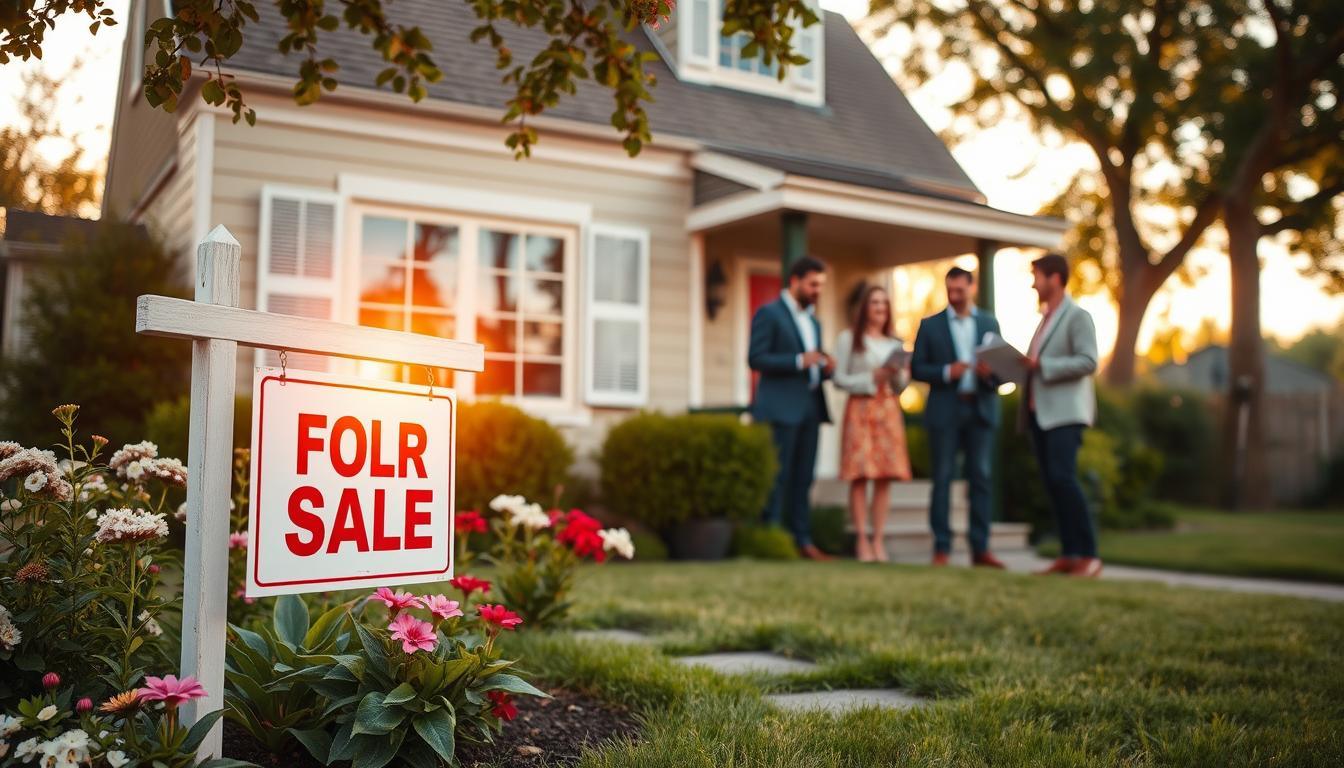Ever thought about selling a house without a lawyer? In places like Florida, many homeowners wonder if it’s possible. With home prices at $411,638 and a 39-day average on the market, knowing your options is key. This guide explores DIY conveyancing, its legal needs, risks, and what happens without a solicitor.
You might be surprised at how easy it can be to handle your property sale yourself.
Key Takeaways
- Florida does not mandate the use of a lawyer for residential real estate transactions.
- Homeowners selling their properties without an agent typically receive offers nearly $100,000 lower than agent-listed homes.
- A title search, while not required by law, is essential for most financing situations.
- Complex situations almost always necessitate legal representation.
- Understanding the conveyancing process is crucial for a successful sale.
Understanding the Conveyancing Process
The conveyancing process is key in any property deal. It makes sure the property’s ownership is legally moved from seller to buyer. This protects both sides. Knowing about conveyancing helps you make smart choices when buying or selling a property.
The Basics of Conveyancing
Conveyancing starts when a property offer is accepted. It goes through many steps until it’s finished. Conveyancers take care of important tasks like:
- Doing property searches to find any problems that might affect the property’s value or use.
- Transferring title deeds on the day of completion and paying off any mortgages left.
- Writing contracts, which become final when both sides sign them.
Why Conveyancing is Essential for Property Transactions
Conveyancing is vital for several reasons:
- It helps avoid legal problems and makes sure everything follows the rules.
- A conveyancer helps protect both the buyer and seller, especially if there’s a mortgage left.
- The process ensures buyers get the right title documents, which are crucial for owning the property.
Common Terms in Conveyancing
Knowing common conveyancing terms makes things easier:
- Under Offer: Means a property has an offer, but the deal isn’t final yet.
- Local Authority Search: A must-do to find out about any local issues that could affect the property.
- Completion: The last step where the buyer gets the keys after the money is transferred.
- Transfer Deed: The legal document needed to officially transfer the property’s ownership.
Can You Sell a House Without a Solicitor?
Many homeowners wonder if they can sell a house without a solicitor. Yes, it’s possible to sell a property on your own. But, you must understand and meet several legal requirements for a smooth sale. Without professional help, dealing with the legal side can be tough, especially if you’re new to it.
Legal Requirements for Property Sales
When selling a house, there are important legal steps to follow. Both the seller and buyer often hire solicitors for the transfer of ownership. Sellers need to fill out documents like Property Information Forms. These forms give buyers important details about the property.
For leasehold properties, a Management Information Pack is also needed. It provides buyers with essential information. While not required for freehold properties, hiring a solicitor is usually a good idea, especially for leasehold sales or complex cases. A solicitor can help manage the timeline, communicate with the buyer’s solicitor, and ensure everything is done on time.
When Is DIY Conveyancing Possible?
DIY conveyancing is an option for sellers who want to handle the sale themselves. It works best for simple sales, like those with cash buyers. Sellers can create contracts, get title deeds, and arrange moving dates. But, doing it yourself can lead to mistakes that might cause legal problems or financial losses.
Some mortgage providers require legal help to protect their interests. So, while DIY might seem attractive, it’s important to consider the risks. Without a solicitor, sellers might face issues that could be easily solved with professional help.

Pros and Cons of Selling Without a Solicitor
Thinking about selling your property without a solicitor? It’s key to know the good and bad sides. We’ll look at both to help you decide wisely.
Advantages of DIY Conveyancing
Many like DIY conveyancing for its cost savings. Legal fees can be £550 to £1,000, including VAT. By doing it yourself, you can save money and control the sale.
- Cost Savings: You keep more money by avoiding solicitor fees.
- Direct Control: You can set terms and times that fit you.
- Speed: Cash buyers can offer quickly, speeding up the sale.
Risks Associated with DIY Property Sales
While DIY conveyancing has its perks, it also comes with risks. Property sales are complex and need careful handling. Mistakes can lead to big legal problems.
- Legal Liability: Wrong paperwork can cause financial trouble or legal fights.
- Lack of Professional Oversight: Without a solicitor, important steps might be missed.
- Incomplete Transactions: Issues like easements or boundary disputes can happen without legal advice.
Understanding these risks is crucial. Weighing the benefits of DIY against the dangers gives a full picture for homeowners.
| Advantages of DIY Conveyancing | Risks Associated with DIY Property Sales |
|---|---|
| Cost savings on legal fees | Legal liability for errors |
| Direct control over negotiations | Lack of professional oversight |
| Potentially faster sales process | Risk of incomplete transactions |
Steps to Successfully Sell Your House Privately
Selling your house privately might seem hard, but it’s doable with the right steps. A good plan helps manage time and covers all sale details. Key steps include setting a timeline, getting your home ready, and marketing it well.
Setting Up a Sales Timeline
Having a clear timeline keeps you organized and focused. Start by setting dates for marketing, open houses, and final talks. Here’s a sample timeline:
| Task | Target Date |
|---|---|
| Prepare home for sale | Week 1 |
| Professional photography | Week 2 |
| List home online | Week 3 |
| Open house event | Week 4 |
| Review offers | Week 5 |
Preparing Your Home for Sale
Getting your home ready is key to making a good first impression. Focus on:
- Cleaning: A clean home looks better.
- Repairs: Fix small problems to make your home more appealing.
- Staging: Rearrange furniture to make rooms look bigger and welcoming.
Marketing Strategies for Selling Property Privately
Good marketing is vital when selling by owner. Here are some strategies to try:
- Online Listings: Post on real estate sites to reach more people.
- High-Quality Photography: Get professional photos to highlight your home’s best points.
- Social Media Promotion: Use social media to share your listing with your network.
- Open Houses: Host open houses on weekends to draw in buyers.

Selling by owner can save you thousands on commissions. It takes work and smart marketing, but it’s worth it if you’re well-prepared and stay on track.
Conclusion
Selling a house without a solicitor is possible, but it’s complex. You must follow legal steps to make the sale smooth. This includes using the right documents and following the law.
Choosing to do it yourself or hiring a professional is key. Knowing the legal process is important. This helps you make the right choice for your situation.
Think about the pros and cons of selling without a solicitor. Legal help can cost between $500 and $1,500. But, solicitors handle important tasks like contracts and title deeds.
For many, the benefits of professional help are worth the cost. This is especially true when legal issues come up.
Before selling your property on your own, think it over. Consider your situation carefully. Getting professional help can give you peace of mind and ensure a successful sale.






